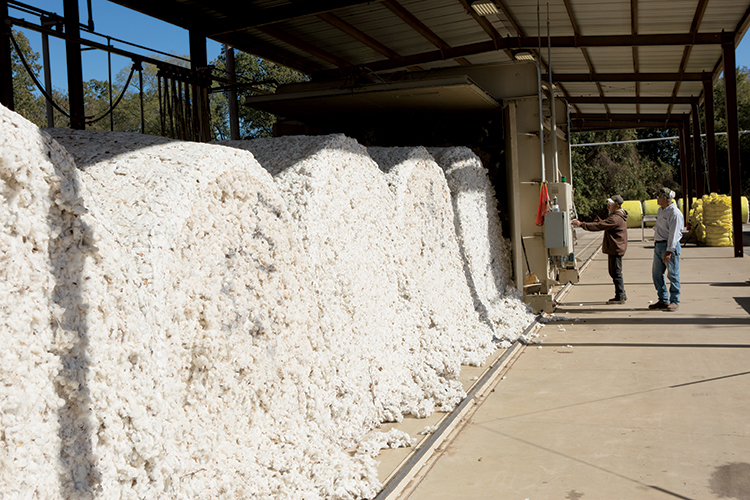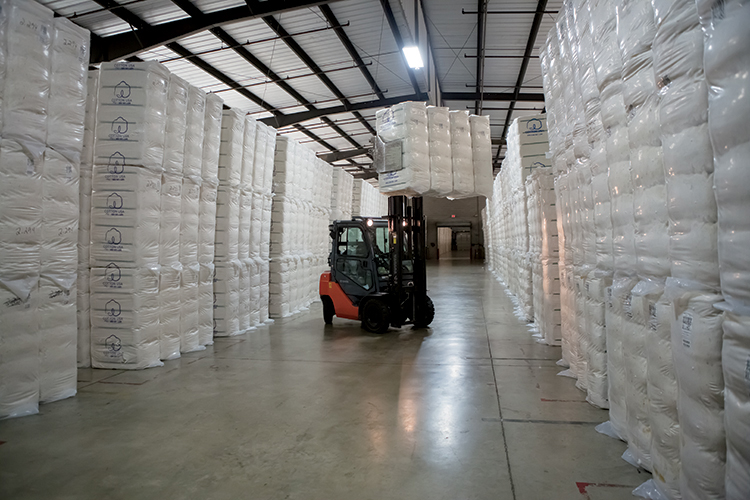Home > Tennessee > Tennessee Crops & Livestock > How Cotton is Woven into Tennessee’s History and Future
How Cotton is Woven into Tennessee’s History and Future
In partnership with: Tennessee Department of Agriculture

The cotton industry is inextricably woven into the fabric of Tennessee’s history and future. Cotton’s economic impact is just as important today as it was the day Eli Whitney first patented the cotton gin more than 200 years ago.
“Cotton is an important crop in this state, in our country, and now across the world,” says Teddy Hazlehurst, owner of Bemis Gin and Warehouse in Jackson. “And ginning has really been the same for a long time. We’ve made improvements, but the mechanics are the same.”
By increasing horsepower and making upgrades in computers and automation to replace old manual controls on the gins, production has increased drastically,” Hazlehurst says. “It’s really incredible the changes I’ve seen in my years in this industry.”

Cotton Ginning
Hazlehurst has been involved in the cotton industry his entire life. His father was a buyer at Bemis Mill, which has spun and woven cotton into fabric since 1901, and his grandfather was a buyer for the historic Anderson Clayton Cotton Company. Hazlehurst bought Bemis Gin in 1987.
“I think I’ve always been about cotton,” he says.
When he took over Bemis Gin, he began making upgrades to the equipment as changes in technology came about.
“When I was in college at the University of Tennessee (UT) at Martin, we studied computers, and I couldn’t imagine what use they would be,” Hazlehurst says. “But when I got here, I quickly realized how much this technology could help.”
Today, technology takes the guessing out of processing cotton. Automation removes the moisture from the cotton, removing that burden from the operator. Improved seed technology also helps farmers increase their yields.
“Our crop is cleaner and softer on our environment than it has ever been,” says Stacey Gorman, director of communications for The Cotton Board. “The UT AgResearch & Education Center in Milan is a premier site for no-till and low-till research, and Tennessee growers can be proud of that and of the impact it has had on our industry nationwide.”
Cotton is a historic and important commodity in Tennessee, and like all areas of agriculture, some years yield higher results than others.
“It has its ups and its downs,” Hazlehurst says. “We change as the market changes. It is all dependent upon the market and competitive prices.”
In 2015, Tennessee’s 23 cotton gins processed about 565,000 bales of cotton – each weighing approximately 500 pounds. The crop generated almost $44 million in revenue. These businesses employ 650 people across the state.
Nationally, 2016 cotton production forecasts were up more than 30 percent from the previous year, according to the USDA National Agricultural Statistics Service.

A Promising Future
While cotton competes with corn for acres and some production moves overseas, U.S. cotton production is still important to the international market. According to USDA’s Economic Research Service, the value of cotton exported from Tennessee in 2014 was $145 million, which earned the state a rank of No. 10 in U.S. cotton exports.
“Consumers still highly value U.S. cotton and spinners still prefer our cotton because it is cleaner than cotton grown in other countries,” Hazlehurst says.
Bemis Gin exports much of their cotton to Turkey, China, Indonesia, Vietnam and Mexico to be spun, but some product does stay in the U.S.
An International Player
Tennessee cotton will continue to play an important role in the domestic and international markets with the help of increasing yields and quality.
“This state is a great place to grow cotton, and we have dedicated producers who are responsible and smart – they know how to make cotton work in a tricky world market,” Gorman says. “The future of cotton here is good. Given the current and future technologies, I see an even more efficient process for producing cotton in Tennessee moving forward.”



